Orientation Video
This video has helpful tips on what to expect during your adventure, how to care for yourself, your fellow trip members, and the Grand Canyon. Your river guides will also provide a detailed orientation specific to your trip type when you arrive.
You are about to embark on one of the most amazing expeditions of your life. Being part of a Grand Canyon rafting trip will challenge you in every way possible. Grand Canyon is a land of extremes; you will be hot/cold/wet/dry/happy/tired/in awe/sandy/relaxed, and ready for more.
Our goal is to provide exceptional rafting trips through Grand Canyon and make your expedition something that will stay with you forever. These trips give you a chance to experience the true spirit of the canyon, gain a new perspective on life, and connect with other like-minded people who appreciate this unique outdoor environment. Spending time in the canyon gives you the chance to be kids again, to laugh and appreciate the small things in life, in a very Grand place.
Your river guides will provide a detailed orientation before your trip, but this video will give you an idea of what to expect on your adventure, how to care for yourself, your fellow trip members, and Grand Canyon.
Cameras/Phones
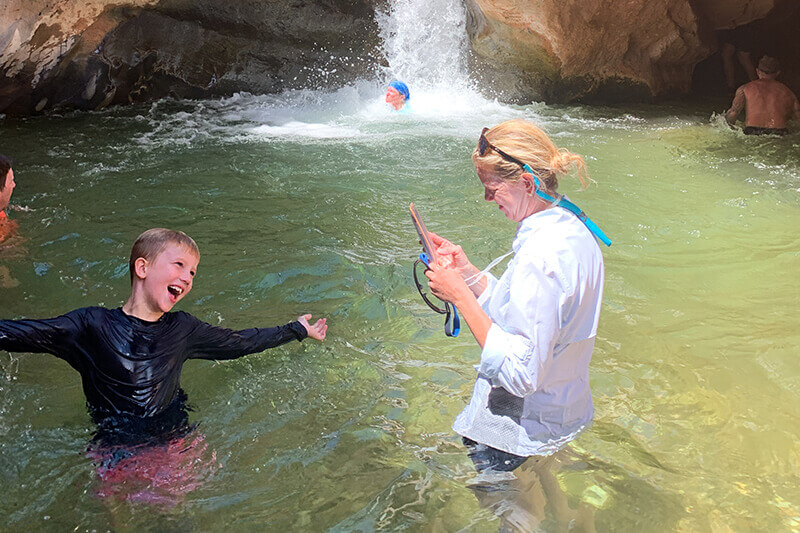 There is no WiFi or cell phone reception in the canyon. If you plan on using your phone as a camera, backup your data before you go and make sure you have lots of memory available. Put your phone in airplane/low power mode to save battery while on the trip. If you are using a camera and can bring additional memory and batteries, be sure to do so. We highly recommend bringing a portable charger or two. For more details, check out our blog on charging devices.
There is no WiFi or cell phone reception in the canyon. If you plan on using your phone as a camera, backup your data before you go and make sure you have lots of memory available. Put your phone in airplane/low power mode to save battery while on the trip. If you are using a camera and can bring additional memory and batteries, be sure to do so. We highly recommend bringing a portable charger or two. For more details, check out our blog on charging devices.
Securing a strap to your camera/phone is very helpful. A waterproof case doesn’t do any good if your camera or phone ends up at the bottom of the river. We recommend keeping your camera in a case even while in the provided dry bag (7” x 14” sealed). We have found that the fine Grand Canyon sand is as much of a danger to your camera as the water. Drones are prohibited per National Park Service rules.
Most personal homeowners’ insurance policies will not cover lost or damaged cameras on your river trip. If you bring items of value, it is your responsibility to provide your own insurance coverage. Grand Canyon Whitewater is not responsible for damage to or loss of personal items during river trips.
Beverages
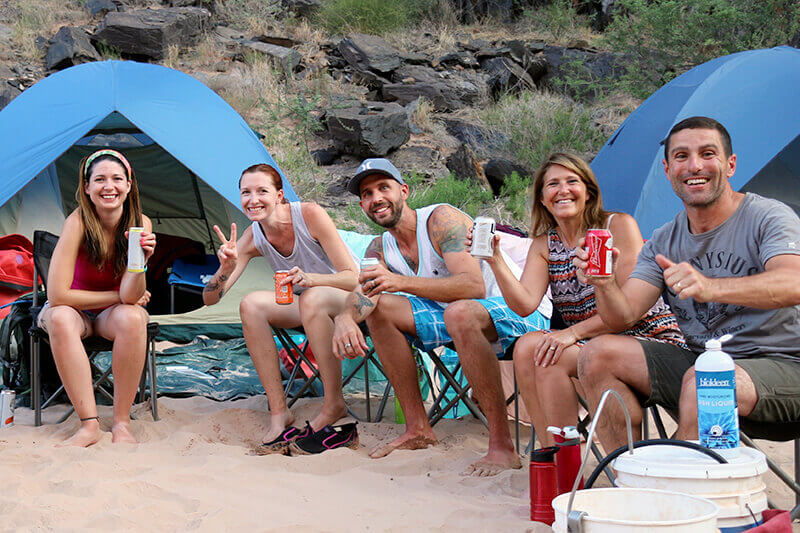 We provide coffee, tea, and hot chocolate at breakfast. Water, electrolyte mix, and a variety of diet and regular soda are always available. If you only drink a certain brand (preferred soda, fruit juices, mixers, tonic, etc.), you may want to bring an additional supply as some choices run out. Since drinking water is not chilled, we recommend that you bring a hard plastic Nalgene-style water bottle so you can chill the water in the river. Insulated water bottles do not allow you to do this.
We provide coffee, tea, and hot chocolate at breakfast. Water, electrolyte mix, and a variety of diet and regular soda are always available. If you only drink a certain brand (preferred soda, fruit juices, mixers, tonic, etc.), you may want to bring an additional supply as some choices run out. Since drinking water is not chilled, we recommend that you bring a hard plastic Nalgene-style water bottle so you can chill the water in the river. Insulated water bottles do not allow you to do this.
We do not supply alcoholic beverages, but you can bring your own. For info on how to get your booze on the trip, check out our blog. All beer must be in cans, not glass. Wine should be in boxes. Liquor in a glass bottle is acceptable, but plastic is preferred. Wine and liquor will be stowed by guides during the day and available in the evenings. Beer will be kept cool by the river and available during the day. Ice may be available in the evenings for cocktails.
Fishing
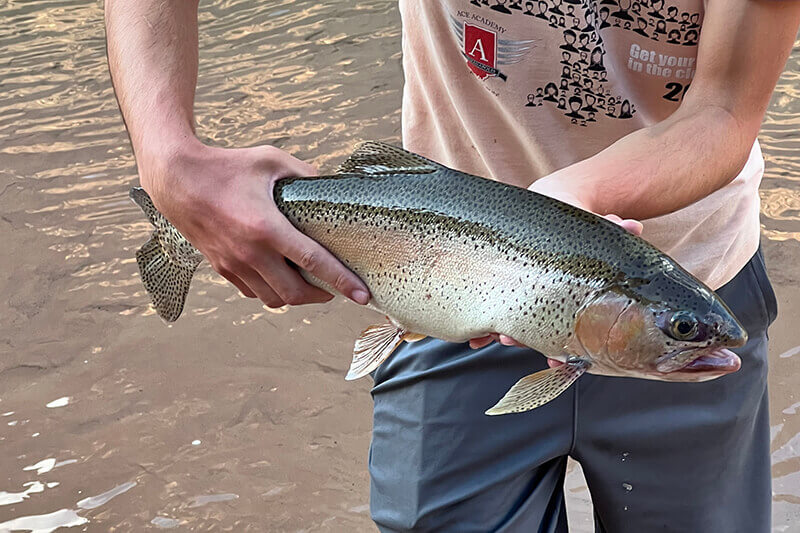 Whether you are an amateur or avid fisherman, casting a line out into the mighty Colorado is a fun and enjoyable activity on a river trip. However, it does require some additional planning and equipment. Here are a few tips and tricks.
Whether you are an amateur or avid fisherman, casting a line out into the mighty Colorado is a fun and enjoyable activity on a river trip. However, it does require some additional planning and equipment. Here are a few tips and tricks.
You may bring a small, collapsible fishing rod. You can fish from the shore but not while the raft is underway. You would be fishing mainly for trout. An Arizona fishing license must be purchased online prior to the trip.
Rod and reel/spin fishing: the best lures have been 1/4 oz to 1/8 oz gold spinners, fluorescent orange z-rays, small daredevils with a spot of orange or fluorescent red, and different colored worms. The Mepps Plain Lure Assortment Kit works great.
Fly fishing: the best setup is a San Juan Worm with a Zebra Midge tied to the hook, size 16-20. You can also use smaller nymphs or scuds.
Camp Life
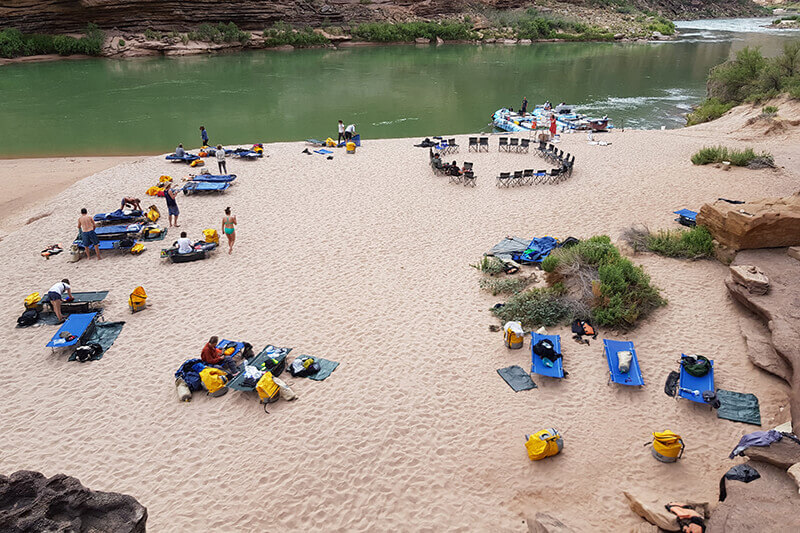 An important aspect of staying healthy while on-river is hydration. The arid environment requires that you drink more water and eat more salty snacks to maintain proper electrolyte balance. Being a desert environment flying insects aren’t usually a big problem, however, this can vary depending on the time of year and recent rains. If you are sensitive to bites you may want to plan accordingly and bring insect repellent and/or long sleeves and pants. Snakes and scorpions are rarely seen. If you do happen to spot any, give them space and notify a guide. You can reduce the possibility of an encounter with a critter even further by shaking out your shoes and PFD in the morning before putting them on and waiting until you are heading to bed to roll out your sleeping bag. Please be respectful of your fellow guests. Consider things like red lights on your headlamp, be thoughtful when using spray sunscreen, and know that marijuana is illegal as Grand Canyon National Park follows federal law.
An important aspect of staying healthy while on-river is hydration. The arid environment requires that you drink more water and eat more salty snacks to maintain proper electrolyte balance. Being a desert environment flying insects aren’t usually a big problem, however, this can vary depending on the time of year and recent rains. If you are sensitive to bites you may want to plan accordingly and bring insect repellent and/or long sleeves and pants. Snakes and scorpions are rarely seen. If you do happen to spot any, give them space and notify a guide. You can reduce the possibility of an encounter with a critter even further by shaking out your shoes and PFD in the morning before putting them on and waiting until you are heading to bed to roll out your sleeping bag. Please be respectful of your fellow guests. Consider things like red lights on your headlamp, be thoughtful when using spray sunscreen, and know that marijuana is illegal as Grand Canyon National Park follows federal law.
Hygiene
Because we’re like a big, close family throughout the river trip, keeping clean is an important factor in staying healthy. Guides will show you the hand-wash system and remind everyone to use it frequently. Soap is allowed only in the main river channel. Bathing in the cold water isn’t always appealing, so baby wipes are an easy alternative. You can’t use soap in or near the side streams but getting in the warmer, clearer water is refreshing and can help to keep you clean. We do NOT recommend bringing solar showers because they are difficult to store and very difficult to use on the river.
During the day, all urine must go directly into the river – that means squatting/standing near the river’s edge, wading in, or using a female urination device. There will be pit stops during the day, but if you have to go between stops, tell the guide before it’s an emergency so they have time to find a good place to pull over. If you need to poop during the day, the guides have a portable toilet system. Don’t be shy to ask for it if you need it. In camp, the guides will set up a camp toilet for solid waste while urine continues to go into the river.
At night, we provide handy pee buckets so you don’t have to find your way to the river in the dark. In the morning, dump your pee bucket directly into the river. The guides will explain sanitation and bathroom procedures in greater detail during on-river orientation.
Ladies, if you might be on your period while on your river trip, it’s helpful to plan ahead and pack for the unexpected. If you will be using tampons, bring an outdoor menstrual kit or several discreet baggies and plenty of baby wipes.
Make sure you keep these supplies handy during the day, in your provided day dry bag. When you change during the day, you can wrap the trash in a baby wipe, put that in a discreet baggie and dispose of it in the boat trash system or into the hygiene disposal at the camp toilet. Using pads is not the best option as you will get wet a lot on your river trip.
Weather
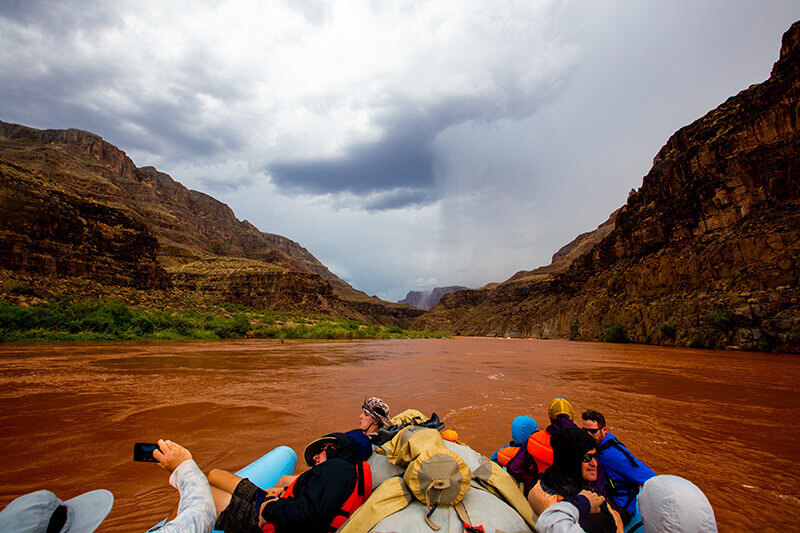 Weather can vary greatly during your trip. Humidity is usually very low, making the high temperatures less uncomfortable. River water temperatures typically range from 50-70°F depending on the time of year. Check the current river temperature here. Keep in mind that extreme weather (heat, cold, wind, rain, hail, flash flooding, etc.) can occur at any time with little to no advanced warning. Follow the packing list to be better prepared for a variety of conditions.
Weather can vary greatly during your trip. Humidity is usually very low, making the high temperatures less uncomfortable. River water temperatures typically range from 50-70°F depending on the time of year. Check the current river temperature here. Keep in mind that extreme weather (heat, cold, wind, rain, hail, flash flooding, etc.) can occur at any time with little to no advanced warning. Follow the packing list to be better prepared for a variety of conditions.
•April and May tend to be sunny with possible late-winter storms. Be prepared for cooler weather!
•June through mid-July is typically quite hot and sunny.
•Mid-July through mid-September is hot and mostly sunny with a strong chance of afternoon thunderstorms.
•Mid-September through October is usually warm and sunny with a chance of an early-winter storm. Be prepared for cooler weather!
How to check: Take a look at our weather blog for links to weather forecasts in the canyon and tips on how to pack accordingly.
Medical and Dietary Considerations
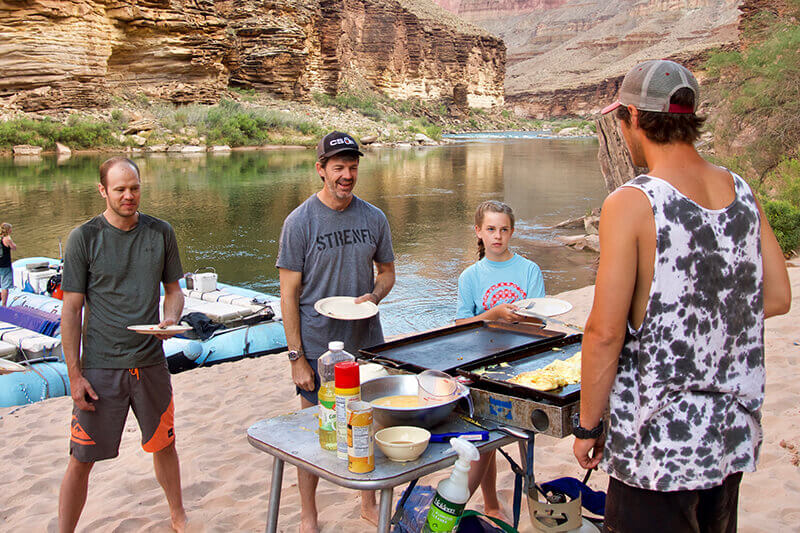 Due to the remote nature of the trip, it is important to understand that access to professional medical care can take several hours or even overnight. If you or someone in your group has any physical, medical or mental conditions, dietary restrictions or allergies, please list this information on your registration form and notify our office as soon as possible. We strongly encourage you to talk to a doctor and take any necessary precautions. Although we can often make modifications for customers who have food allergies, we want you to understand that we cannot guarantee 100% safeguard from exposure to your allergen. Be sure to bring your required medications, including EpiPens, on the trip.
Due to the remote nature of the trip, it is important to understand that access to professional medical care can take several hours or even overnight. If you or someone in your group has any physical, medical or mental conditions, dietary restrictions or allergies, please list this information on your registration form and notify our office as soon as possible. We strongly encourage you to talk to a doctor and take any necessary precautions. Although we can often make modifications for customers who have food allergies, we want you to understand that we cannot guarantee 100% safeguard from exposure to your allergen. Be sure to bring your required medications, including EpiPens, on the trip.
Multi-day river trips are active, outdoor adventures and can be challenging. Extreme weather, cold river water, and other factors add to the intensity. Please see your acknowledgement of risk form for additional potential risk factors. If you have essential prescription medication, it is advisable to split your medication into two waterproof containers ahead of time so you can keep half and give half to the trip leader for backup storage. Be sure to clearly label all containers. If you have any questions regarding your ability to participate in this trip, please consult your doctor and call our office so that we may help answer your questions.
Emergency Information
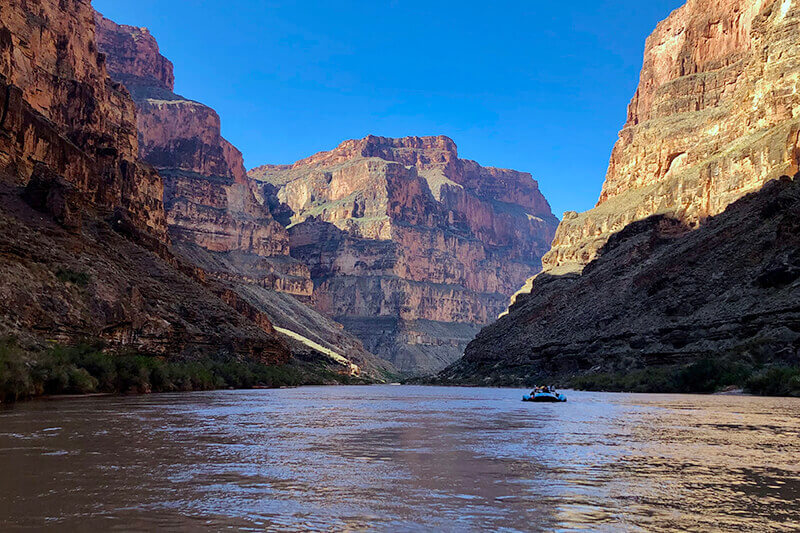 One of the benefits of a river trip in Grand Canyon is the rare opportunity to be disconnected. There is no cell service or WiFi. We do carry satellite communication devices, but they are only used for outbound messages in the event of an emergency on the river. These devices remain turned off and are not used for incoming messages/calls. In the unlikely event that we could get a message to our guests, there are almost no options to leave the trip and exit the canyon, even if there is an emergency at home. We think it is important to discuss with your family ahead of time whether you would want to receive news of an emergency or death while on the river, as there will likely be nothing you can do until the end of your trip. Feel free to share our office number with your family so that they can reach us while you’re away.
One of the benefits of a river trip in Grand Canyon is the rare opportunity to be disconnected. There is no cell service or WiFi. We do carry satellite communication devices, but they are only used for outbound messages in the event of an emergency on the river. These devices remain turned off and are not used for incoming messages/calls. In the unlikely event that we could get a message to our guests, there are almost no options to leave the trip and exit the canyon, even if there is an emergency at home. We think it is important to discuss with your family ahead of time whether you would want to receive news of an emergency or death while on the river, as there will likely be nothing you can do until the end of your trip. Feel free to share our office number with your family so that they can reach us while you’re away.
Risk
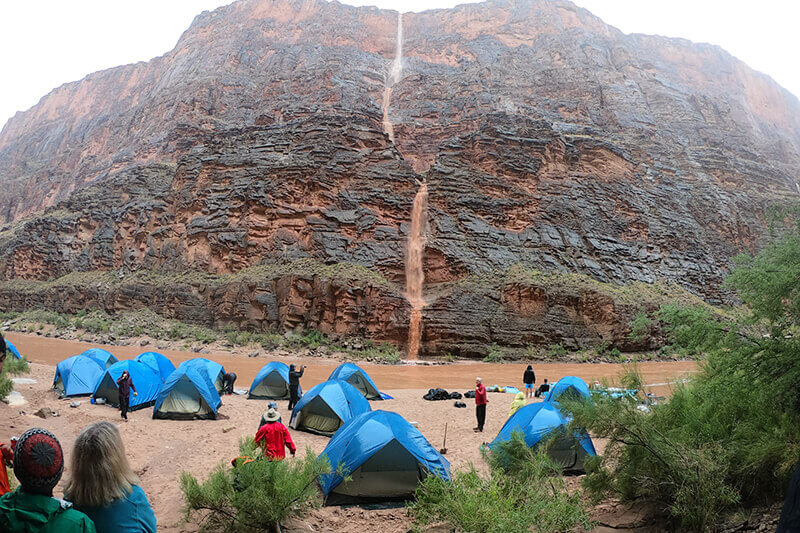 Our experience through the years has shown that river rafting trips are fun vacations. You should recognize, however, that there is an element of risk in any adventure or activity associated with whitewater rafting and the outdoors. Check with your local agent concerning your insurance needs. The Visitor’s Acknowledgement of Risk form must be understood and signed by each passenger 18 years and older. Minors must have a parent/legal guardian sign for them. Each spouse must sign individually; one cannot sign for the other.
Our experience through the years has shown that river rafting trips are fun vacations. You should recognize, however, that there is an element of risk in any adventure or activity associated with whitewater rafting and the outdoors. Check with your local agent concerning your insurance needs. The Visitor’s Acknowledgement of Risk form must be understood and signed by each passenger 18 years and older. Minors must have a parent/legal guardian sign for them. Each spouse must sign individually; one cannot sign for the other.
Travel Protection
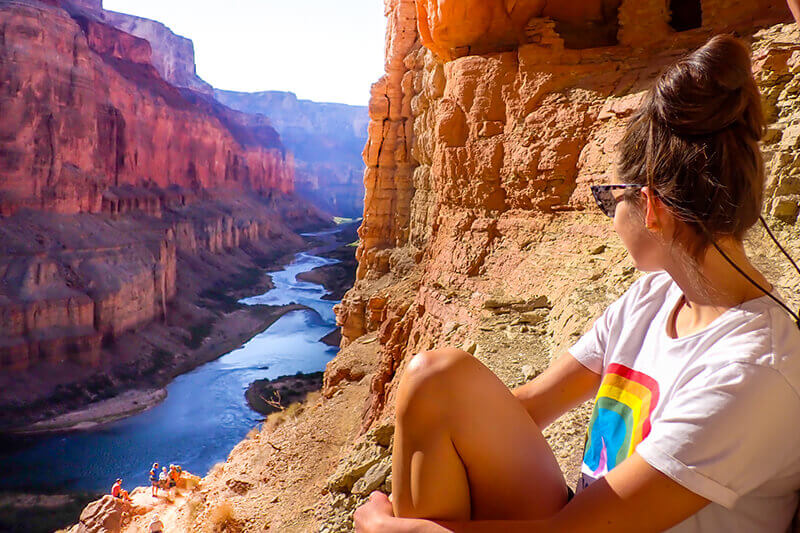 GCW highly recommends that you purchase travel insurance after making the initial deposit for your river trip. No one ever plans to cancel their Grand Canyon river trip. But, believe us, unpredictable situations arise like family illness/injury, flight delays, etc. Look for additional benefits like trip interruption, emergency medical expenses, trip delay, baggage delay, etc. Make sure your coverage includes all your travel dates, and not just your rafting trip dates. We suggest Travelex Insurance Services for U.S. residents; international guests, please research your insurance options. It is your responsibility to choose the policy that works for you. Go to Travelex Insurance Services (800-228-9792) for more info. Use Reference Code 03-0146
GCW highly recommends that you purchase travel insurance after making the initial deposit for your river trip. No one ever plans to cancel their Grand Canyon river trip. But, believe us, unpredictable situations arise like family illness/injury, flight delays, etc. Look for additional benefits like trip interruption, emergency medical expenses, trip delay, baggage delay, etc. Make sure your coverage includes all your travel dates, and not just your rafting trip dates. We suggest Travelex Insurance Services for U.S. residents; international guests, please research your insurance options. It is your responsibility to choose the policy that works for you. Go to Travelex Insurance Services (800-228-9792) for more info. Use Reference Code 03-0146
Rafting Trip Policies
It’s important for everyone in your party to understand our trip policies – including our Cancellation Policy.




